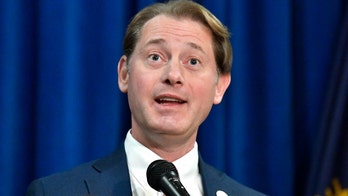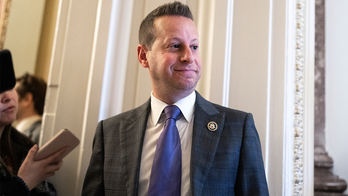As the health care debate heats up in Congress, in town halls and in rallies across the country, a battle is being waged in America's houses of worship as well.
When President Obama used the phrase "bearing false witness" on Aug. 19 to describe opponents of his health care reform plan in an address to religious leaders, it set off a firestorm of religious banter about who really has the moral high ground when it comes to health care.
Emerging in the fight are two distinct Christian factions that mirror the political Left and Right. Each understands that the language of religion has power; each speaks in platitudes of truth, justice and moral absolutes.
On the left is the Rev. Jim Wallis, who sits on Obama's faith-based council and whose mantra has been that "All God's children deserve coverage," emphasizing the "moral obligation" of reforming health care. Wallis is spearheading a "40 days of health reform" campaign to counter what he says is misinformation from the religious right.
On the other side, unofficially leading the religious right, is Tony Perkins, head of the Family Research Council. Perkins says it's ironic that the left is steeping its fight in biblical mandates when “they've been accusing the right of trying to create a theocracy" in government.
Perkins remarked after Obama's speech to a joint session of Congress last week that "President Obama continued to mislead the American people by casually dismissing the concerns of millions of Americans who have deep moral objections to their tax dollars paying for abortions."
Both sides agree that there is a moral mandate to provide health care, but defining that mandate has fueled the fight. The bottom line for any religion in the health care debate is whether America can, and should, create public policy that lives up to the scriptural directive to "heal the sick."
"The healing activity of Jesus was a sign of the Kingdom of God breaking into the lives of people," says Father Edward Beck, a Catholic priest in New York City. "When Jesus, the Divine Physician, healed, people's lives were restored and changed forever. He commands that we do likewise."
But Pastor Tommy Nelson of Denton Bible Church in Denton, Texas, says biblical mandates do not necessarily require government intervention. He says the Old Testament Law of God provided care for Israel. Gleanings had to be left ungathered for the poor, and every third year tithes of the city went into a "food closet" for the poor. But "the weight of the law was not on organized governmental care but the personal responsibility -- the 'Good Samaritan' ethic that each Jew had to his fellow man," Nelson says.
From the Torah's perspective, that's true. Rabbi Leonard Sharzer of the Jewish Theological Seminary in New York City says health care doesn't exist in the Torah, but there is an obligation for physicians to heal the sick, and for individuals to help those who cannot help themselves.
Sharzer, a senior fellow in bioethics at the Finkelstein Institute of Religious and Social Studies, says the Talmud -- the book of Jewish instruction written centuries later -- requires society to provide health care for its citizens, especially for the poor. But, he points out, "when it comes to the cost of hi-tech medicine, we're all poor."
Procedures like MRIs and CAT scans, advanced cancer treatments, open-heart surgery, and many others cost hundreds of thousands of dollars. Very few of us, if any, can pay out of pocket, Sharzer says.
So the moral ground is not so simple as the parable of "The Good Samaritan (Luke 10: 25-37)," which describes a man assaulted by robbers and left on the side of the road. A priest and a Levite pass by, and both ignore the man. But a Samaritan takes pity, binds up the man's wounds, takes him to an inn and instructs the innkeeper to care for the man's needs. And he gives the innkeeper money to ensure that it will be done.
Scholars say there are two ways to look at this parable: as a mandate for society to "bind up' the wounds of the less fortunate -- in other words, public policy; or as a requirement for personal responsibility -- a private plan.
Biblical scholars point out that Jesus was giving instructions to his followers, the sheep of his church, and that he was not addressing the civil authorities. With that in mind, they say, a "biblical mandate" for health care reform has strange implications for a country founded on the separation of church and state.
But Sharzer says it doesn't matter, because most religions looking to their own texts, even secular groups, will somehow draw the same conclusions: Health care is moral and good.
While the Koran has few verses about health care, a Muslim coalition is hosting a hearing on health care reform in Washington this week. The Koran scripture heading the press release sites Haddith 780:
"Ask God for forgiveness and health, for after being granted certainty, one is given nothing better than (good) health."
Most religious and moral peoples seem to agree that good health is next to godliness. But the devil is in the details -- and that’s where Congress steps in.




